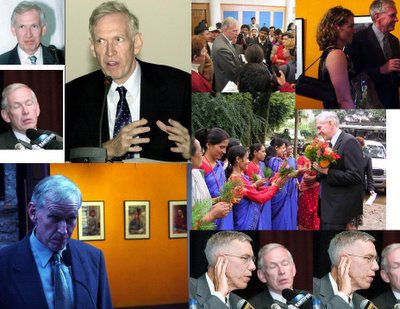
Moriarty came out recently all cylinders fired warning the parties to not form an alliance with the Maoists. It was an inaccurate assessment of what was going on. No alliance was being formed.
Moriarty has had a choice between being on the side of a military or a political solution to the conflict. I think he has been on the side of a political solution. That option asks for dialogue with the Maoists. That is what Bamdev Gautam enaged in. Gautam needs to be commended and thanked for the historic meeting he had with Prachanda.
The parties assured him he was mistaken in his assessment.
It is important for the peace process that a false impression does not get created that the parties were about to forge an alliance with the Maoists and Moriarty saved the day. One, it would be patently false. Two, the Maoists as a political force do not have a high regard for the US as a power. Personally I think it is a little simplistic and slightly inaccurate what they say, but that is secondary. The parties can not afford to be seen as the tail the US dog is wagging.
Moriarty's strength has been to suggest the US will not under any circumstance tolerate the idea of a military takeover of the country by the Maoists, or a communist republic. But no Nepali feels the country is even remotely close to that scenario. The Maoists themselves don't. But that same stance has also been his weakness. His intoxicating personal meetings with the king might enhance the sense of importance of an emissary, but that same phobia has been used by the king for his relentless attacks on the democratic middle.
Moriarty has not been able to protect that democratic middle from the king, and I don't blame him for that. A foreign ambassador can do only so much. But then he should also not try too hard to protect the king from that democratic middle, he should not try at all. One, he can't. Two, it hurts the cause of democracy. Three, it hurts the peace process.
Now he is out in Delhi suggesting the parties should perhaps take part in the municipal polls. That utterance shows how detached from Nepal's ground realities Moriarty is.
The Constituent Assembly is the only reason the parties and the Maoists are talking. If the parties were to abandon that plank, the civil war will restart tomorrow. That is the fire Moriarty is playing with. Moriarty's utterances are not about power the way it should be, but power the way it is. And the Nepali people are already aware of the power configuration. Moriarty need not remind.
If Moriarty thinks the Constituent Assembly is a bad idea, he should come out saying why. He can not ignore the topic if he is serious about peace and democracy in Nepal.
Municipal polls are not the mainstream, they are the extreme.
The parties and the Maoists are both for elections: elections to a constitutent assembly, like in Iraq. Nepal deserves the same, and will get the same.
Moriarty's warning shot that the US might abandon the parties and ally with the king if the parties were to forge an alliance with the Maoists was misplaced. The US ambassador already has been with the king. Sure, the military aid has been halted. But the words of the ambassador have not been clearly on the side of the parties.
The ambassador would be making major contributions by coming out openly for the idea of a constituent assembly. If the US and India officially come around to it, progress towards peace will be much faster.
Preaching democracy is vague, preaching the roadmap called constituent assembly will work.
The 5% Arithmetic
As a Madhesi, after you leave the Madhesh, you end up being a member of 50% of the population who is reduced to being barely 5% of the presence or less. Be it at some school in Kathmandu, or in the mini Nepals in America. The Pahadi-Madhesi dynamic inescapably follows. You have the choice between becoming a Mr./Ms. 5% Madhesi - internalizing the prejudice, ignoring the insults, softening the voice, relishing the token gestures - and being yourself. When you are yourself, the Mr./Ms. 5% Madhesi (Osmosis) is not an ally. The prejudiced Pahadi is an opponent. So what are your options?
The option is called reverse psychology. It is about realizing two things. One, it is not about numbers. The Bahuns are less than 10% of the population in Nepal. But they have kept all other groups thrown off balance. Two, it is a fight on the second floor, not the first floor. (Two Storey Building) All you got to do is assert your collective identity, and hit back at that same level, one on one. It works. All you need is you. You use words.
Pahadi Bahuns As Madhesi
In the West that is what they are as brown people. But the consciousness is lacking. Like the lacking Madhesi consciousness in Nepal.
In The News
Writ petition filed against NGO code of conduct NepalNews
US working with India for common vision on Nepal: Moriarty
NC(D) general convention in January
WB forecasts 6.9 percent GDP growth in South Asia
India has “very very high stakes” in Nepal: Saran
Media has right to broadcast news: former CJ
Code of conduct aimed at silencing the rights defenders: AIN
Ex-minister launches Democratic Nepal party
Time for action by Nepal King: US Outlook (subscription), India
Nepal's Delhi re-visit sees fresh diplomatic activities Kantipur Online, Nepal
Talks in Foreign Land Won’t Serve National Interest: Minister
Nepal political talks in Delhi denied NewKerala.com, India
Nepal opposition, Maoists to hold talks in 'safe' Delhi
UK, US support efforts to bring Maoists to mainstream
No comments:
Post a Comment